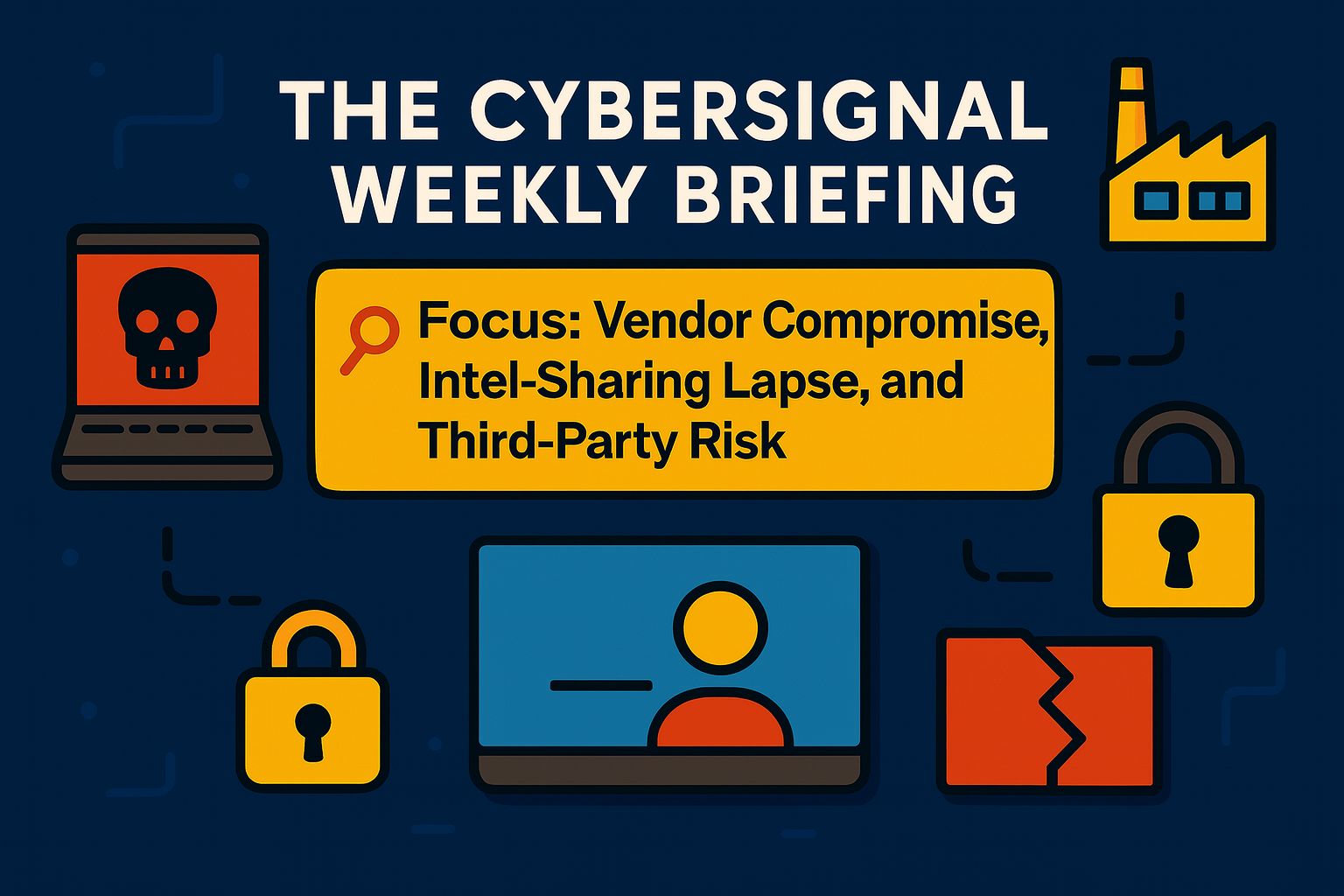👋 Welcome Back
Hello and welcome back to The CyberSignal Weekly Briefing — your Thursday download of everything that shaped cyber in the U.S. and Canada since last Thursday.
Between zero-days in enterprise software, vendor-side breaches, and a policy vacuum in federal intel-sharing, this week showed how fragile trust can be across the cyber ecosystem. When the vendors we rely on get compromised — and when coordination at the national level falters — defenders are left to close ranks on their own.
From Oracle’s exploited zero-day and Red Hat’s GitLab breach to the Discord vendor hack exposing user IDs, we break down what happened, why it matters, and how security leaders should respond before the next ripple hits.
Whether you’re a CISO, SOC lead, or security practitioner, this briefing is your operational compass for what to watch, patch, and plan next.
🔎 Overview: What Moved the Needle This Week
Oracle zero-day exploited — Cl0p ransomware gang weaponizes CVE-2025-61882 in Oracle E-Business Suite attacks, impacting major enterprises. (Security Boulevard)
Red Hat consulting breach — Compromised GitLab instance exposes client data across 800+ organizations tied to Red Hat’s consulting operations. (Kaseya)
Discord vendor hack — Third-party support contractor breach leaks ~70K users’ ID photos and verification records. (The Guardian)
DraftKings credential stuffing — Attackers exploit reused passwords to access customer accounts; MFA urged across platforms. (TechRadar)
Cyber intel law lapses — Congress lets the Cybersecurity Information Sharing Act expire, weakening private–public coordination. (Wall Street Journal)
M&A surge in security — Forty deals in September mark record consolidation across identity, supply-chain, and network defense firms. (SecurityWeek)
✨ Check Out the #1 AI News Source
The Gold standard for AI news
AI will eliminate 300 million jobs in the next 5 years.
Yours doesn't have to be one of them.
Here's how to future-proof your career:
Join the Superhuman AI newsletter - read by 1M+ professionals
Learn AI skills in 3 mins a day
Become the AI expert on your team
🔥 Key Incidents & Analysis
Oracle’s E-Business Suite was hit with an unauthenticated remote code execution flaw (CVE-2025-61882), leveraged by the Cl0p ransomware group to breach enterprise environments.
Why it matters: EBS remains in broad enterprise use, especially among finance, HR, and ERP systems — exposing them to high-impact compromise.
Action: Prioritize patching or mitigation (WAF rules, segmentation), hunt for indicators of compromise in EBS modules, and confirm backdoors or persistence stashes.

Red Hat disclosed that a GitLab instance used for internal consulting purposes was breached. The incident potentially touches more than 800 organizations whose data was tied to the consulting environment.
Why it matters: Even environments deemed “internal / partner / consulting” are attractive to attackers as pivot points or aggregation hubs.
Action: Review your relationships with consulting partners, check for shared credentials or access, and verify whether your organization’s data was part of exposed repositories.
Roughly 70,000 Discord users had identity documents, support exchanges, and account metadata exposed after a third-party support vendor was breached.
Why it matters: This is another cautionary tale around delegated services: attackers often see these as easier entry points.
Action: If your organization outsources identity verification, customer support, or document processing, ensure zero trust boundaries, audit logs, and encryption standards are strictly enforced.
Although DraftKings claims its systems were not breached directly, threat actors accessed user accounts via credential stuffing or brute force using external credential corpuses.
Why it matters: Credential reuse and weak MFA adoption remain pervasive; exposure elsewhere often causes downstream account takeover.
Action: Enforce MFA, monitor for credential stuffing attempts, force password resets for high-risk accounts, and alert users to reuse risks.
Congress allowed the 2015 Cybersecurity Information Sharing Act (CISA) to lapse, removing liability protections for private companies that voluntarily share threat intel with the federal government.
Why it matters: Without legal shields, many organizations may retreat from sharing, weakening collective defensive posture.
Action: Monitor any legislative revival efforts, evaluate whether internal contracts or industry ISACs can help bridge the gap, and weigh the legal counsel around sharing cyber threat data in the interim.
September 2025 saw 40 announced cybersecurity M&A deals, spanning identity, network security, supply chain, and risk management firms.
Why it matters: M&A trends often presage shifts in strategic priorities — consolidation in identity and supply chain may indicate where tech investment will focus next.
Action: Reassess vendor dependence — if your provider is being acquired, validate continuity, integration risk, or shifts in roadmap and support.
⚠️ Threat & Vulnerability Highlights
Threat / CVE | Domain of Impact | Why It Matters to U.S. / Canada |
|---|---|---|
CVE-2025-61882 (Oracle EBS zero-day) | Enterprise systems | Exposes critical financial / ERP infrastructure to remote exploitation |
Red Hat / GitLab breach | Vendor / partner infrastructure | Breach of shared or consulting environments can ripple through to client orgs |
Discord vendor compromise | Identity / PII | Exposed identity documents & account metadata via a third party |
Credential stuffing attacks | Authentication | High volume of downstream account takeover (ATO) potential |
Intelligence sharing gap (CISA lapse) | Policy / coordination | Collective cyber resilience may weaken without legal incentives to share |
🛡️ Actionable Playbook for CISOs & IT Leaders
Patch & monitor Oracle EBS chains — apply fixes, isolate modules if necessary, and hunt for post-exploit artifacts.
Audit third-party connectors and support vendors — enforce zero trust, contractually require logging, encryption, and incident alerting.
Disallow credential reuse & strengthen MFA — enforce strong authentication, step-up on risky sessions, monitor for stuffing campaigns.
Establish internal sharing frameworks — in absence of federal liability shield, formalize internal and cross-industry information sharing mechanisms.
Run post-merger resilience reviews — if your vendors are in flux due to acquisition, validate continuity and security roadmaps.
Exercise tabletop scenario: “partner breach → lateral compromise” — simulate attacker bridging through outsourced systems.

🏛️ Regulatory, Legislative & Structural Shifts
⚠️ Cyber intel sharing act lapse — Congress lets the Cybersecurity Information Sharing Act (CISA) expire, removing liability protections for private companies sharing threat data with the government. Expect reduced intel exchange until renewal. (Wall Street Journal)
🏢 Third-party vendor accountability — Following the Red Hat and Discord vendor breaches, regulators may tighten expectations for contract-level security obligations, audit rights, and encryption standards. Aligns with NIST SP 800-161 Supply Chain Security Guidance.
🍁 Canadian privacy enforcement — Cross-border incidents like the Discord vendor leak are expected to trigger new guidance from the Office of the Privacy Commissioner of Canada (OPC) under PIPEDA for outsourced data handling and breach notification.
⚖️ Breach disclosure scrutiny — U.S. state attorneys general continue to push for faster reporting and transparency; delayed notifications may draw heavier fines under state-level data protection laws. See Maine AG Breach Portal for current filings and enforcement activity.
💼 Cyber M&A oversight rising — Regulators increasingly examine how merging security firms manage customer data, incident response, and integration risk — expect cybersecurity due diligence to become standard in major acquisitions. (SecurityWeek)
📊 Poll of the Week
Which of the following do you see as your chief exposure over the next 6 months?
🔭 Looking Ahead
Expect further zero-day exploitation, especially in widely deployed enterprise stacks (ERP, identity, CRM).
Attackers will increasingly weaponize third-party and consulting environments as pivot points.
With CISA’s liability protections off the table, many in private sector may become reticent to share intel — watch for sector ISACs or new legal reforms.
Consolidation in security software will accelerate — be alert to vendor roadmaps shifting post-merger.
Identity verification and document handling will be major attack surfaces, especially in sectors that outsource those functions.
💡 Pro Tip of the Week
When engaging with vendors or third-party services, require proofs of integrity: cryptographic logs, signed update chains, and remote attestation where feasible.
Also, simulate adversaries hopping from vendor to core — if they can’t traverse your segmentation, you’ve gained defensive depth.
🔒 Conclusion
This week’s theme was trust — and how easily it fractures.
We saw vendors breached, identities leaked, and policy frameworks lapse, all while attackers move faster than bureaucracies. The message is clear: defense now depends on independence.
When national coordination slows and third parties falter, the organizations that thrive will be those who treat every external dependency as a potential attack surface — verifying every connection, every contract, and every credential.
Thanks for reading this edition of The CyberSignal Weekly Briefing.
Till next week,
The CyberSignal Team
📩 Found this roundup useful? Share The CyberSignal with a colleague who needs to stay ahead of cyber threats.
Stay Ahead with Daily CyberSignal Reports
Upgrade to The CyberSignal Daily for morning reports with the latest breaches, CVEs, and actionable insights before your day begins.


